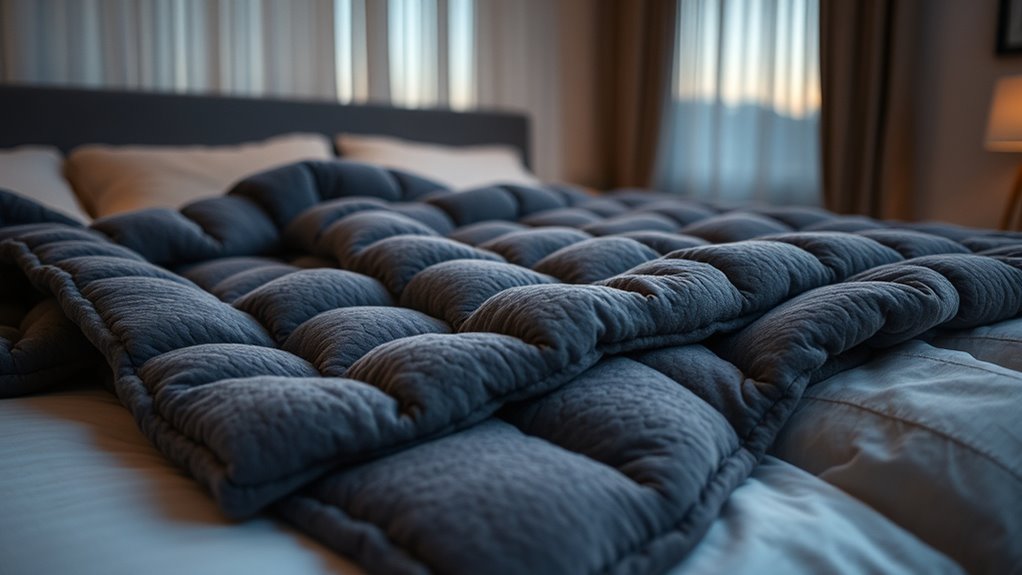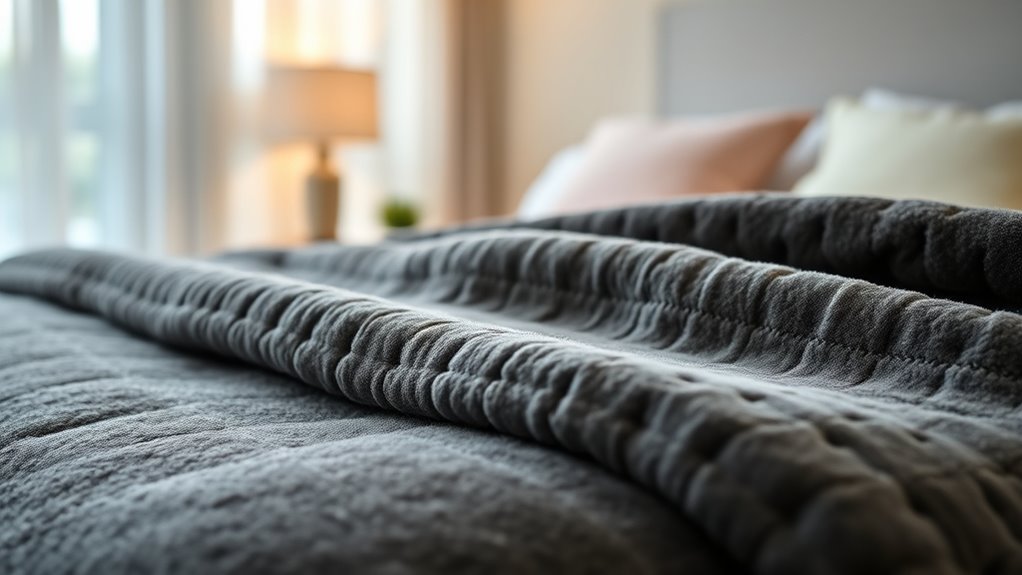Many believe that heavier weighted blankets are always more effective, but that’s a misconception. The right weight actually depends on your comfort and personal needs, not just size. Using a blanket that’s too heavy can cause discomfort or make breathing feel restricted. Typically, experts recommend a blanket around 10% of your body weight. To find what works best for you, consider your preferences and needs as you explore further.
Key Takeaways
- Heavier blankets are not automatically more effective; comfort and personal preference are more important.
- Excessively heavy blankets can cause discomfort or restrict movement, reducing their calming benefits.
- Choosing a blanket around 10% of your body weight usually offers optimal sensory support.
- The effectiveness of a weighted blanket depends on individual comfort, not just its weight.
- Factors like sleep environment and personal needs influence sleep quality more than blanket weight.

Have you ever wondered if all the claims about weighted blankets are true? You’ve probably heard that a heavier blanket automatically means better comfort or more effective sleep. But that’s not always the case. While many people rave about their benefits, including how weighted blankets can aid sensory integration and improve sleep, it’s important to understand that heavier isn’t necessarily better for everyone. The idea that a blanket must be as heavy as possible to be effective is a common misconception. In reality, choosing the right weight depends on your body size, preferences, and specific needs.
Weighted blankets are designed to provide gentle deep pressure stimulation, which can help with sensory integration by calming your nervous system. This gentle pressure mimics a comforting hug, helping to reduce anxiety and promoting relaxation. Many users report falling asleep faster and experiencing more restful sleep with the right-weighted blanket. However, these effects aren’t guaranteed just because the blanket is heavy. The key is finding a weight that feels comfortable and soothing, not overwhelming. If a blanket is too heavy, it can cause discomfort, restrict movement, or even disrupt your sleep rather than enhance it.
It’s also important to take into account that a heavier blanket can be less practical for certain people, especially those with respiratory issues or mobility challenges. A blanket that’s too heavy might feel suffocating or cause discomfort during the night. The goal is to find a balance—one that offers enough pressure for sensory integration benefits but doesn’t feel like a burden. Experts recommend choosing a blanket that’s around 10% of your body weight, which strikes a good balance for most people. This ensures you get the calming effects without feeling weighed down or restricted.
Many misconceptions arise from marketing claims or anecdotal stories that assume a heavier blanket will automatically lead to better sleep. But sleep improvement isn’t solely about weight; factors like mattress comfort, room temperature, and personal preference play significant roles. The bottom line is that heavier isn’t always better. You should prioritize comfort and how the blanket feels on your body. If it’s too heavy, it might cause discomfort or even anxiety, defeating the purpose of using it for relaxation. Ultimately, choosing the right weight is about personal comfort and ensuring the benefits of sensory integration are achieved without sacrificing ease of movement or breathing.
Frequently Asked Questions
Are Weighted Blankets Safe for Children?
You might wonder if weighted blankets are safe for children. Generally, they can be, but children safety depends on choosing the right size and weight. Always opt for blankets made with safe, breathable blanket materials, and follow manufacturer guidelines. Supervise young children when using the blanket, and consult a healthcare professional if you have concerns. Remember, a properly selected weighted blanket promotes comfort without compromising safety.
Do Heavier Blankets Help With Anxiety?
About 78% of users report improved comfort levels with slightly heavier blankets, which can help reduce anxiety. Heavier blankets can promote relaxation and potentially enhance sleep quality, but they aren’t always better for everyone. If a blanket is too heavy, it might cause discomfort or restrict movement. Focus on finding a weight that feels comfortable for you, as this balance is key to easing anxiety without sacrificing comfort.
Can a Weighted Blanket Cause Health Issues?
You might wonder if a weighted blanket can cause health issues. While it can improve sleep quality and reduce sensory overload for many, choosing the wrong weight or using it improperly can lead to discomfort or restricted movement. Always pick a blanket that’s about 10% of your body weight and make certain you’re comfortable. If you experience pain or difficulty breathing, remove it and consult a healthcare professional.
How Do I Choose the Right Weight?
When choosing the right weight for your blanket, consider your body size and personal comfort. Typically, a blanket should be about 10% of your body weight. Check fabric choices for breathability and softness, as they affect comfort. Think about purchase considerations like durability and ease of cleaning. You want a blanket that feels cozy without being too heavy, ensuring you’ll enjoy its calming benefits every night.
Are There Alternatives to Weighted Blankets?
Did you know about 35% of people seek alternatives to weighted blankets? If you’re concerned about fabric types or material concerns, you might consider a snug quilt, a plush throw, or a calming eye mask. These options offer comfort and sensory input without the heaviness. Choosing the right alternative depends on your preferences and sensitivities, so explore different fabrics and materials to find what works best for you.
Conclusion
Remember, a heavier blanket isn’t always better. It’s about finding what’s comfortable, what’s supportive, what helps you relax. Don’t assume more weight means more comfort. Don’t believe heavier is always safer. Don’t think heavier guarantees better sleep. Instead, prioritize your comfort, your needs, your preferences. Because when it comes to weighted blankets, lighter or heavier, it’s about what works for you, what makes you feel secure, what helps you rest. Choose wisely, sleep better.









